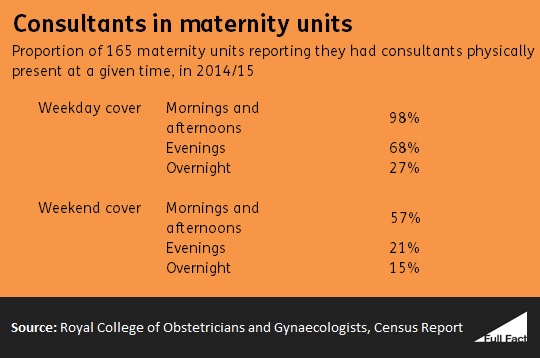“Three in four labour wards have no consultants overnight. A major audit published today also reveals that almost half of hospitals lack senior specialists at weekends.”
Daily Mail, 26 October 2016
“A survey of 165 maternity units found that in 2014/2015 around 27% of labour wards have consultants physically present overnight on weekdays, falling to 15% at the weekend.
Telegraph, 26 October 2016
This is correct. Around 27% of maternity units surveyed reported that they had consultants providing weekday overnight care in 2014/15.
During the day 98% of units reported that they had consultants physically present.
These figures are based on a census of maternity units carried out by the Royal College of Obstetricians and Gynaecologists.
Levels of care at the weekend were lower
During the day at the weekend, 57% of units which responded said that they had consultants providing care. Overnight it was 15% of units.
The Royal College confirmed that the other 85% of units responded that they had no weekend overnight care.
However, the proportion of units reporting that they had consultants working in the unit overnight at the weekend had increased since the previous year. In 2013/14 it was reported that only 7% of units had overnight care at the weekend. These figures aren’t a direct comparison as almost all units (197) responded in 2013/14 compared to 82% (165) in 2014/15.
Altogether the 165 maternity units said that they had 2,067 consultants working in them and 67% said the consultants were present for 60 hours a week or more.
The Clinical Director of Women’s Services for NHS England told a committee of MPs in 2013 that obstetric units will always have at least one consultant on call at all times even if there is not a consultant physically present in the unit.
There is some debate over what impact having consultants on call rather than present has on patient care.
 Most births take place in these units
Most births take place in these units
The vast majority of births in England take place in NHS obstetric units where care is led by consultants. In 2012 it was 87% according to NHS England’s National Maternity Review. However research has suggested only a quarter of women want to give birth in these units.
The other options are midwifery units or birthing centres, or giving birth at home.
The review also found that the stillbirth and neonatal mortality rate in England fell by 20% in the ten years between 2003 and 2013. But it also acknowledged that “these positive headline indicators, belied variation across the country in terms of the outcomes for women and babies and the quality of the services they receive.”
 Most births take place in these units
Most births take place in these units